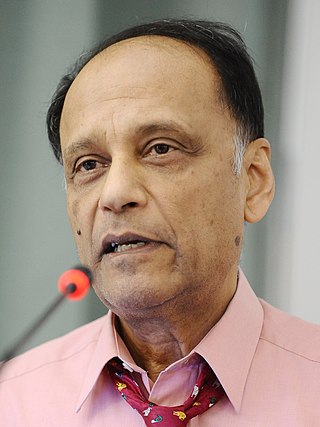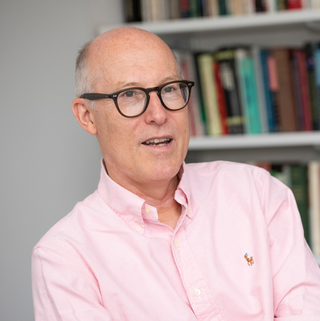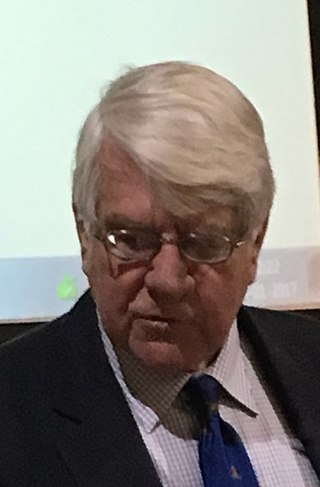Related Research Articles

Kenneth Joseph Arrow was an American economist, mathematician, writer, and political theorist. He was the joint winner of the Nobel Memorial Prize in Economic Sciences with John Hicks in 1972.

Lawrence Lau Juen-yee, GBS, JP is a Hong Kong economist and the former Vice-Chancellor of the Chinese University of Hong Kong. He was a non-official member of the Executive Council of Hong Kong from 2009 to 2012. Before joining CUHK he was an economics professor at Stanford University.

Sir Angus Stewart Deaton is a British economist and academic. Deaton is currently a Senior Scholar and the Dwight D. Eisenhower Professor of Economics and International Affairs Emeritus at the Princeton School of Public and International Affairs and the Economics Department at Princeton University. His research focuses primarily on poverty, inequality, health, wellbeing, and economic development.

Sir Partha Sarathi Dasgupta is an Indian-British economist who is Frank Ramsey Professor Emeritus of Economics at the University of Cambridge, United Kingdom, and a fellow of St John's College, Cambridge.
Henri (Hans) Theil was a Dutch econometrician and professor at the Netherlands School of Economics in Rotterdam, known for his contributions to the field of econometrics.

Jean Tirole is a French professor of economics at Toulouse 1 Capitole University. He focuses on industrial organization, game theory, banking and finance, and economics and psychology. In 2014 he was awarded the Nobel Memorial Prize in Economic Sciences for his analysis of market power and regulation.

Sir Timothy John Besley, is a British academic economist who is the School Professor of Economics and Political Science and Sir W. Arthur Lewis Professor of Development Economics at the London School of Economics (LSE).

Sir Richard William Blundell CBE FBA is a British economist and econometrician.

Orley Clark Ashenfelter is an American economist and the Joseph Douglas Green 1895 Professor of Economics at Princeton University. His areas of specialization include labor economics, econometrics, and law and economics. He was influential in contributing to the applied turn in economics.

Leonid Hurwicz was a Polish-American economist and mathematician, known for his work in game theory and mechanism design. He originated the concept of incentive compatibility, and showed how desired outcomes can be achieved by using incentive compatible mechanism design. Hurwicz shared the 2007 Nobel Memorial Prize in Economic Sciences for his seminal work on mechanism design. Hurwicz was one of the oldest Nobel Laureates, having received the prize at the age of 90.

Eric Stark Maskin is an American economist and mathematician. He was jointly awarded the 2007 Nobel Memorial Prize in Economic Sciences with Leonid Hurwicz and Roger Myerson "for having laid the foundations of mechanism design theory". He is the Adams University Professor and Professor of Economics and Mathematics at Harvard University.
Robert Butler Wilson, Jr. is an American economist and the Adams Distinguished Professor of Management, Emeritus at Stanford University. He was jointly awarded the 2020 Nobel Memorial Prize in Economic Sciences, together with his Stanford colleague and former student Paul R. Milgrom, "for improvements to auction theory and inventions of new auction formats". Two more of his students, Alvin E. Roth and Bengt Holmström, are also Nobel Laureates in their own right.
John Halstead Hardman Moore CBE FBA FRSE is an economic theorist. He was appointed George Watson's and Daniel Stewart's Chair of Political Economy at the University of Edinburgh School of Economics in 2000. In 2018 he was appointed the David Hume University Professor at the University of Edinburgh. Previously, in 1983, he was appointed to the London School of Economics, where in 1990 he became Professor of Economic Theory, a position he still holds.

Ehud Kalai is a prominent Israeli American game theorist and mathematical economist known for his contributions to the field of game theory and its interface with economics, social choice, computer science and operations research. He was the James J. O’Connor Distinguished Professor of Decision and Game Sciences at Northwestern University, 1975-2017, and currently is a Professor Emeritus of Managerial Economics and Decision Sciences.
Timothy Avelin Roughgarden is an American computer scientist and a professor of Computer Science at Columbia University. Roughgarden's work deals primarily with game theoretic questions in computer science.
Peter Jackson Hammond, is a Professor of Economics and a Research Associate for CAGE at the University of Warwick. In the past he has also worked as the Marie Curie Professor of Economic Theory at the University of Warwick and an Emeritus Professor of Economics at Stanford University. He has made numerous significant contributions to the advancement of Economic Theory.

Guido Wilhelmus Imbens is a Dutch-American economist whose research concerns econometrics and statistics. He holds the Applied Econometrics Professorship in Economics at the Stanford Graduate School of Business at Stanford University, where he has taught since 2012.
Hervé Moulin is a French mathematician who is the Donald J. Robertson Chair of Economics at the Adam Smith Business School at the University of Glasgow. He is known for his research contributions in mathematical economics, in particular in the fields of mechanism design, social choice, game theory and fair division. He has written five books and over 100 peer-reviewed articles.
Ilya R. Segal is an economist who is currently Roy and Betty Anderson Professor in the Department of Economics at Stanford University. His research focuses on microeconomic theory, particularly contract theory, mechanism design and auction design. His research interests include the design of competition policy, property rights, contracts, auctions, and other economic mechanisms. Segal has been elected to the American Academy of Arts and Sciences, is a Fellow of the Econometric Society and member of the Toulouse Network for Information Technology. His other awards include Compass Lexecon prize for “the most significant contribution to the understanding and implementation of competition policy,” a Guggenheim Fellowship, a fellowship at the Institute for Advanced Study at Princeton, an Alfred P. Sloan Research Fellowship, and a Hoover Fellowship.
Benjamin Golub is an American economist who is a professor of economics and computer science at Northwestern University. His research focuses on the economics of networks. He was named the winner of the 2020 biannual Calvó-Armengol International Prize, which recognizes a “top researcher in [e]conomics or social sciences younger than 40 years old for contributions to the theory and comprehension of the mechanisms of social interaction.”
References
- ↑ "Home Page – Matthew O. Jackson" . Retrieved 2013-02-20.
- ↑ Ravindran, Sandeep (2016-08-09). "Profile of Matthew O. Jackson". Proceedings of the National Academy of Sciences. 113 (32): 8888–8890. Bibcode:2016PNAS..113.8888R. doi: 10.1073/pnas.1610801113 . ISSN 0027-8424. PMC 4987829 . PMID 27457940.
- ↑ "Games and Economic Behavior Editorial Board" . Retrieved 2013-02-20.
- ↑ "Review of Economic Design – incl. option to publish open access (Editorial Board)" . Retrieved 2013-02-20.
- ↑ "Welcome to the website of The Econometric Society An International Society for the Advancement of Economic Theory in its Relation to Statistics and Mathematics" . Retrieved 2013-02-20.
- ↑ "Coursera.org". Game-theory-class.org. Retrieved 2013-02-20.
- ↑ "Prize | Maison de la Recherche en Sciences Humaines" . Retrieved 2013-02-20.
- ↑ "Berkeley Electronic Press". Archived from the original on 2012-09-10. Retrieved 2013-02-20.
- ↑ "Matthew O. Jackson Named Guggenheim Fellow | Caltech". 2005-04-18. Retrieved 2013-02-20.
- ↑ Jackson, Matthew O. "CV – Matthew O. Jackson" (PDF).
{{cite web}}: CS1 maint: url-status (link) - ↑ BBVA Foundation Frontiers of Knowledge Award 2021